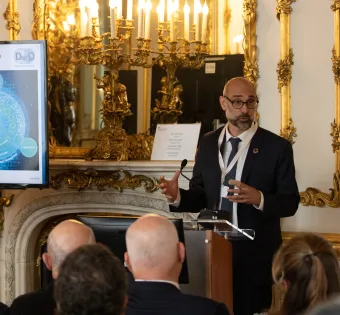
The Alan Turing Institute, the national institute for data science and artificial intelligence (AI), has today launched a ground-breaking Turing Research and Innovation Cluster focusing on digital twins (TRIC-DT).
The National Oceanography Centre’s Associate Director of Digital Ocean, Dr John Siddorn, has been appointed TRIC-DT co-director and will help steer an energetic team of the UK’s outstanding leaders in this field.
The TRIC-DT aims to democratise access to emerging digital twin technology by providing open and reproducible computational and social tools for digital twin development and deployment as a national service. It will support the creation of specialised expertise and new computational digital twin infrastructure, unlocking barriers that previously hindered their use.
A digital twin is a virtual replica of a physical process or system that is dynamically updated using data collected from real-time monitoring of its physical counterpart. Globally, digital twin technology is proving to be a powerful tool in a range of areas, and their rapid development and deployment is helping to address real-world problems.
Since joining NOC in 2020, Dr Siddorn has championed growth and collaboration within the digital twin community and in raising awareness of the positive societal impact they can bring to the UK. As an author on the ‘An Information Management Framework for Environmental Digital Twins (IMFe)’, John has been key to thought leadership in his field and in shaping the current landscape of digital twin innovation.
Dr Siddorn commented, “It is really exciting to be part of TRIC-DT, a unique activity that brings together experts from such a wide range of disciplines. We will develop how we use our data and digital assets in innovative and novel ways so that we have an opportunity to have a real societal impact. My hope is that we can make progress in ensuring data is there to support better decision making, much needed in the context of climate change and increasing natural hazards and their impact on society.”
Since its inception in 2015, the Turing has established one of the largest concentrations of digital twins research and innovation in the UK, in areas from aerospace and civil engineering to urban modelling and agricultural monitoring. Working alongside a range of partners the Turing is developing twins that are informed by the latest thinking in AI, with the aim of addressing important societal challenges and generating tangible, real-world benefits.
Speaking at AI UK, Mark Girolami, Chief Scientist at The Alan Turing Institute, said “The TRIC-DT will help to democratise access to digital twin technology by providing open and reproducible computational and social tools. These tools will be available for digital twin development and deployment as a national service – freely accessible to the UK research and innovation communities. Working alongside a range of partners, the creation our first TRIC will build on the wealth of digital twin activity and investment.”
The TRIC-DT will pull on both the Turing’s existing multidisciplinary academic expertise, established research engineer and community science capability, as well as on development partners across the UK.
The Turing intends to establish knowledge exchange between a central impact hub and a network of collaborators across the academic and private sectors. Research activity will be anchored on a set of societally-important challenges.
The TRIC-DT will work closely with partner organisations and will explicitly focus on solving significant societal challenges and generating tangible societal benefits in:
- Environment and sustainability: predicting and mitigating the negative impacts of climate change
- Infrastructure: enhancing the efficiency and resilience of critical infrastructure
- Health: improving human health and wellbeing
These areas map onto those of the Institute more broadly, as well as aligning with the national priority areas. The TRIC-DT, has already successfully appointed an energetic team of some of the UK’s outstanding leaders in this field, including five co-directors:
- John Siddorn Associate Director (Digital Ocean, National Oceanography Centre)
- David Wagg (Professor of Nonlinear Dynamics, University of Sheffield)
- Keith Worden (Professor of Engineering, University of Sheffield), and
- Kristine Dale (the Met Office's Principal Fellow for Data Science and Co-Director of the University of Exeter and MET office’s Joint Centre for Excellence in Environmental Intelligence)
- Steven Niederer (Professor of Biomedical Engineering at King's College London)